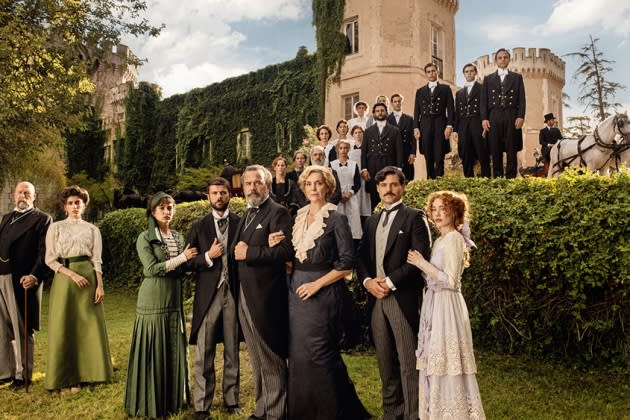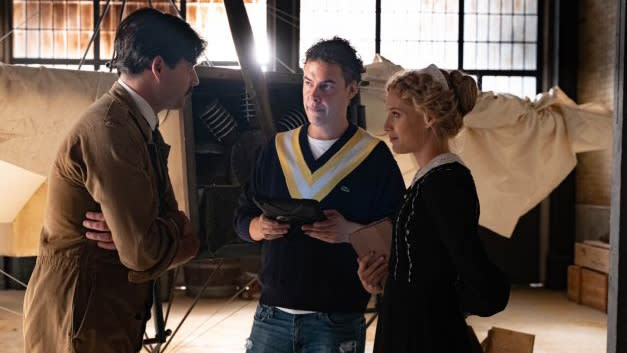Studiocanal Brings Bambu’s ‘The Vow’ onto the Mipcom Market, Driving Deeper into Daily Dramas (EXCLUSIVE)
- Oops!Something went wrong.Please try again later.

Famed for its premium series, European production-distribution giant Studiocanal and Spanish partner Bambu Producciones (“Velvet,” “Cable Girls”) are now driving ever deeper into premium daily dramas, first with “Two Lives” and now with “The Vow,” which Studiocanal is bringing onto the market at Mipcom.
The show is produced by Studiocanal-owned Bambú Producciones, led by Ramón Campos and Teresa Fernández Valdés, and the creator of successful daily shows, Josep Cister.
More from Variety
Spanish public broadcaster RTVE, which co-produces with Studiocanal and Bambu, retains rights to Latin America and the U.S.
Created by Cister, “The Vow,” which went into production in Spain this September, weighs in at 122 one-hour episodes.
Unspooling across the stunning landscape of Southern Spain, “The Vow” begins in 1913 as Jana, a maid at the declining but still ruthless house of Luján seeks revenge for the death of her mother, while she searches for her brother, abducted at birth, most likely by the Lujans.
What Jana doesn’t anticipate, however, is that she will fall in love with Manuel, son of the Count of Lujan.
Directed by Miguel Conde, Javier Pulido, Eva Bermúdez and Alberto Pernet, “The Vow” follows smartly on the heels of Bambú’s prior daily series “Two Lives,” also created by Josep Cister and currently nominated for an International Emmy with a Rose d’Or award already under its belt.
“We are confident that ‘The Vow’ will have a similarly successful journey as it has all the ingredients that make a daily show attractive but with a more ambitious production budget which gives the series a very premium look,” said Beatriz Campos, Studiocanal SVP global sales and production financing.
Daily dramas – especially Latin American telenovelas – have begun to hit extraordinary figures on Netflix, remarkable for both the number of hours watched and the longevity of their chart-topping popularity.
“Two Lives” has penetrated territories where long running Spanish series have not been broadcast before such as Scandinavia, Campos noted.
Studiocanal has already sold “Two Lives” to 47 territories including Finland, Norway, Italy, Central and East Europe. She added. “In Italy, it premiered with extraordinary results. We will continue working with and supporting Bambu and Josep so we have more quality daily dramas like ‘Two Lives’ and ‘The Vow.’ We wish the latest a very long broadcasting journey,” Campos told Variety.
“The Vow is a co-production between Studiocanal and RTVE. Our joint investment on the series has resulted in a much higher production budget compared to the standard budget for this type of content,” Campos added.
Variety talked to Cister on the eve of Mipcom.
One of the achievements of modern Spanish TV has been its ability to juggle with different genres in the same fiction. “The Vow” looks like a case in point, mixing a murder mystery, romantic melodrama and period detail.
Most certainly, “The Vow” is one example. It begins with a bang, with mystery and intrigue, which spirits us to a rural Palacio in a Spain of 1913. From then on, the series opens up to various plot lines which allows us to move between different genres: Intrigue, mystery, romance, drama, even light doses of comedy. This allows us to open up the gamut of stories which we want to tell.
The series is described as a premium daily drama. Could you drill down on the premium elements you’re looking for?
Yes, one of Bambu’s hallmarks is the quality of its products and this quality and excellence is a goal in the daily dramas as well.
Studiocanal’s boarding the series as a co-producer, as was the case with “Two Lives,” has allowed for a leap of quality, destroying the boundaries between these series and primetime or premium series. We’ve achieved that by raising technical levels to those of a premium series, working in a 3,000 square-meter studio, having a ratio of location scenes higher than the normal, and counting on the Prague Philharmonic Orchestra to play the series’ score.
Inevitably, much of the series will turn around the class gulf, immense in 1913 and still key in 2022. Can you comment?
The series has a global vocation. The class struggle wasn’t exclusive to Spain at the time. Anybody from any country in the world can feel themselves reflected in the conflicts of “The Vow.” Setting the series in 1913 has allowed us from today’s perspective to note how much we’ve changed and in what was, which was a compelling experience.
One reference for many viewers will be Bambú Producciones’ hugely successful “Gran Hotel,” which aired on free-to-air channel Antena 3 over 2011-13. How have Spanish series evolved in the last decade?
“Gran Hotel” is one of Bambú Produccioness iconic titles and a milestone in Spanish fiction production. Since then, Spanish fiction has grown from adolescence to maturity. Spain now has a powerful industry with professionals with great talent and large experience, which allows us to shoot “The Vow” like a series which is very close to primetime titles.

Best of Variety
The Best Pop Culture Halloween Costumes for 2022: From 'House of the Dragon' to 'Euphoria'
Constance Wu Gets Candid in Revealing New Memoir 'Making a Scene'
Sign up for Variety’s Newsletter. For the latest news, follow us on Facebook, Twitter, and Instagram.
